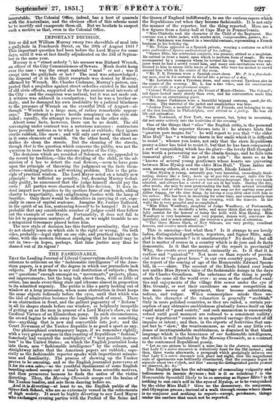IMPORTANT DECISION.
Do or did not William Murray sweep two shovelfuls of mud into a gullyhale in Fenchurch Street, on the 28th of August 18M? This important question had been before the Lord Mayor for some days, until it was at last finally adjudicated on the 23d of Septem- ber in the same year.
Murray is a "street orderly "; his accuser was Richard Wrench, an officer of the City Commissioners of Sewers. , Much doubt hung over the c.aae : was the swept material " mud " or not ; was it swept into the gullyhole or not ? The mud was acknowledged ; the disposal of it in the illicit receptacle was denied by Murray, affirmed. by Wrench. Mr. Charles Cochrane, Murray's patron, sus- pected that a prqjudice against street orderlies existed in the mind of old civic officers, supported also by the ancient mud interests of the City : and the suspicion was natural, but it was not made out. A witness was adduced in exculpation; but he was a brother or- derly, and he damaged his own credibility by a judicial blindness to the presence of Wrench on the eventful 28th of August—al- though "Wrench is a large man of rather remarkable appear- ance." The attempt to prove hostile conspiracy on the civic aide failed ; equally, the attempt to prove fraud on the other side. About some facts, however, there can be no doubt. The old scavenging under contract was a notorious nuisance : contractors have peculiar notions as to what is mud or rubbish; they ignore sterile rubbish, like snow; and will only cart away mud that has in it some elements of wealth. On the other hand, the street or- derlies do clean the streets. But the cleaning of the streets, though that is the question which concerns the public, was not the question in issue before the supreme justice of the City. The decisions which are recorded of Solomon, or are appended to the record by tradition —like the dividing of the child, or the ad- mission of a bee to detect the real flowers,—seem to have gone upon the principle of throwing the judgment on the facts them- selves—making justice a self-working problem. This is the prin- ciple of practical wisdom. The Lord Mayor acted on a totally new principle : he inflicted no penalty, but, deeming Murray techni- cally guilty, he announced that the judge himself should pay the costs ! All parties were charmed with this decision. It does in- deed impart new beauties to the spotless fame of our bench, adding charity to impartiality, and enlightening Justice with the lamp of Sacrifice. Only there would be difficulties in carrying it out, espe- cially in cases of capital sentence. Imagine Mr. Justice Talfourd, in the spirit of an Ion, sentencing himself to be hanged ! It is not probable that any considerable number of judges could thus follow out the example of our Mayor. Fortunately, it does not fall to his lot to pronounce sentence of death, or we might tremble to see a misguided Greenaere placed before him. The new style of decision has this further peculiarity, that you do not clearly learn on which side is the right or wrong. On both sides, probably—legal right on one side, and practical right on the other, with the modern Solomon adjudging that he himself may be cut in two—in hopes, perhaps, that false justice may thus be shamed out of its rigour ?


























 Previous page
Previous page